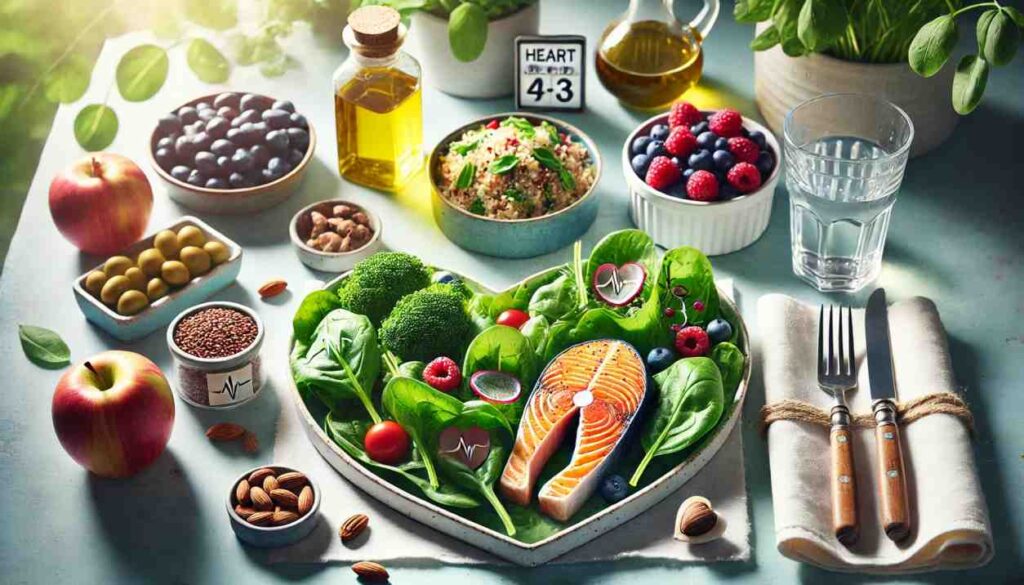
Our product evaluations are completely independent and free from advertisements. Should you make a purchase via the links on our website, we might receive a small commission, which is a key support for our review process. For more details, click here.
With heart disease being the leading cause of death globally, it’s never been more crucial to focus on what you eat. The good news? Small dietary changes can make a huge difference in your heart health.
Heart and blood pressure-focused diets aim to lower cholesterol, reduce hypertension, and improve overall heart function.
In this guide, we explore several heart-healthy diets, including the DASH Diet, MIND Diet, TLC Diet, Mediterranean-DASH Diet, Low-FODMAP Diet, and the Pritikin Diet. These diets provide science-backed strategies to promote heart health and manage blood pressure. You can find more interesting diets in this guide.
Why Heart and Blood Pressure Focused Diets Matter
Cardiovascular disease is a leading cause of death worldwide, and hypertension is one of its major risk factors. However, high blood pressure and heart disease can be effectively managed with diet. Eating nutrient-dense foods, reducing sodium, and increasing heart-healthy fats can significantly lower the risk of heart disease and improve overall cardiovascular health.
Key Benefits of Heart-Healthy Diets
- Lower Blood Pressure: These diets focus on reducing sodium and increasing potassium, both of which help lower blood pressure.
- Improve Cholesterol: Many heart-focused diets reduce LDL (bad cholesterol) and increase HDL (good cholesterol).
- Support Weight Management: By emphasizing whole, unprocessed foods, these diets help maintain a healthy weight.
- Reduce Stroke and Heart Disease Risk: A heart-healthy diet promotes cardiovascular function and reduces the risk of stroke and heart attacks.
- Cognitive Benefits: Some diets also promote brain health, helping to prevent neurodegenerative diseases.
1. DASH Diet (Dietary Approaches to Stop Hypertension)

The DASH Diet is designed specifically to reduce high blood pressure by focusing on nutrient-rich foods and limiting sodium. It emphasizes:
- Key Foods: Fruits, vegetables, whole grains, lean proteins, and low-fat dairy.
- Health Benefits: Lowers blood pressure, improves cholesterol levels, and promotes weight loss through high-fiber, low-calorie foods.
Top Recipe:
Grilled Chicken and Avocado Salad
Combine grilled chicken with mixed greens, avocado, and a light olive oil dressing for a DASH-approved meal.
Bonus Tip: Keep track of sodium intake using an app like MyFitnessPal to ensure you’re meeting DASH guidelines.
2. MIND Diet (Mediterranean-DASH Intervention for Neurodegenerative Delay)
The MIND Diet combines elements of the Mediterranean and DASH diets to support brain health and lower the risk of Alzheimer’s disease while benefiting heart health.
- Key Foods: Green leafy vegetables, berries, whole grains, nuts, and olive oil.
- Health Benefits: Reduces cognitive decline, improves heart health, and supports overall well-being.
Top Recipe:
Spinach and Berry Salad
Mix fresh spinach with strawberries, walnuts, and feta, topped with olive oil and balsamic vinegar.
Bonus Tip: Focus on leafy greens and berries for cognitive and heart health. Results may show reduced blood pressure within weeks, but long-term brain benefits take longer.
3. TLC Diet (Therapeutic Lifestyle Changes)
Developed by the NIH, the TLC Diet focuses on lowering cholesterol through a low-fat, high-fiber approach.
- Key Foods: Fruits, vegetables, whole grains, and lean proteins.
- Health Benefits: Lowers LDL cholesterol, improves heart function, and supports weight loss.
Top Recipe:
Lentil and Vegetable Soup
Cook lentils with carrots, celery, and tomatoes in a low-sodium broth for a heart-healthy meal.
Bonus Tip: Combine the TLC diet with regular physical activity to enhance cholesterol-lowering benefits.
4. Mediterranean-DASH Diet
This hybrid diet combines the heart-healthy fats of the Mediterranean Diet with the low-sodium principles of DASH. It’s perfect for improving cholesterol levels and controlling blood pressure.
- Key Foods: Olive oil, nuts, fish, fruits, vegetables, and whole grains.
- Health Benefits: Improves cholesterol, lowers blood pressure, and supports long-term cardiovascular health.
Top Recipe:
Baked Salmon with Quinoa
Serve baked salmon with quinoa and a drizzle of olive oil and lemon juice for a nutrient-packed meal.
Bonus Tip: The Mediterranean-DASH Diet is a great middle ground between focusing on reducing sodium and adding healthy fats like olive oil and fish.
5. Low-FODMAP Diet

Though primarily used to manage digestive issues, the Low-FODMAP Diet can support heart health by reducing inflammation. It limits certain fermentable carbs that can cause discomfort for people with IBS while encouraging nutrient-rich, unprocessed foods.
- Key Foods: Lean proteins, low-FODMAP vegetables, and heart-healthy fats.
- Health Benefits: Reduces bloating, inflammation, and supports overall heart health.
Top Recipe:
Grilled Chicken with Steamed Zucchini
Serve grilled chicken with steamed zucchini seasoned with olive oil and lemon for a heart-healthy, low-FODMAP dish.
Bonus Tip: Low-FODMAP foods like spinach, zucchini, and bananas are great for digestion and heart health.
6. Pritikin Diet
The Pritikin Diet is a low-fat, high-fiber plan focused on reducing cholesterol and improving heart function.
- Key Foods: Fruits, vegetables, whole grains, and lean proteins.
- Health Benefits: Lowers blood pressure, reduces cholesterol, and promotes healthy weight loss.
Top Recipe:
Vegetable Stir-Fry
Stir-fry vegetables like broccoli, bell peppers, and carrots in olive oil and serve over brown rice for a filling heart-healthy meal.
Bonus Tip: Stick to whole, unprocessed foods like fruits, vegetables, and whole grains to meet Pritikin’s low-fat guidelines.
* If you wish to try different diets options covering other specific topics see links below:
Low-Carb/High-Fat Diets | Fasting and Intermittent Fasting Guide
Foods that Support Heart Health
Building a heart-healthy diet means incorporating nutrient-dense foods while cutting back on harmful ingredients. Here are some key foods to focus on, along with new ideas on how to enjoy them:
1. Leafy Greens
Leafy greens like spinach, kale, and collard greens are packed with fiber, antioxidants, and important vitamins like vitamin K, which is known for protecting your arteries and promoting proper blood clotting. They also help reduce cholesterol and improve circulation, key factors in preventing heart disease.
Recipe Idea: Sautéed kale with garlic and a splash of apple cider vinegar, served alongside grilled chicken.
2. Berries
Berries such as blueberries, strawberries, and raspberries are known for their high antioxidant content, particularly anthocyanins, which reduce inflammation and oxidative stress. They help maintain artery health and lower blood pressure, keeping your heart in top condition.
Recipe Idea: A mixed berry and spinach smoothie bowl topped with sliced almonds and chia seeds for a heart-boosting breakfast.
3. Whole Grains

Whole grains like oats, quinoa, and barley provide soluble fiber, which binds to cholesterol in the digestive tract and helps remove it from the body. These grains are essential for lowering LDL cholesterol and stabilizing blood sugar, reducing the overall risk of cardiovascular disease.
Recipe Idea: Barley salad with roasted vegetables, chickpeas, and a lemon-tahini dressing for a fiber-rich, heart-friendly meal.
4. Fatty Fish
Fatty fish like salmon, mackerel, and sardines are some of the best sources of omega-3 fatty acids, which have been shown to reduce triglycerides, lower blood pressure, and decrease inflammation in the arteries. Omega-3s are also linked to improved heart rhythms and a reduced risk of sudden cardiac events.
Recipe Idea: Baked mackerel with a citrus glaze, served with roasted sweet potatoes for a complete heart-healthy dinner.
5. Nuts and Seeds
Nuts like almonds and walnuts, along with seeds such as flaxseeds and chia seeds, offer a powerful combination of fiber, healthy fats, and antioxidants. They help lower cholesterol levels, reduce inflammation, and promote overall cardiovascular health.
Recipe Idea: A handful of walnuts or almonds as a quick snack, or sprinkle flaxseeds over your morning oatmeal to give your heart a nutritious boost.
6. Olive Oil
Olive oil, particularly extra virgin olive oil, is a staple in Mediterranean diets and an excellent source of monounsaturated fats. These healthy fats help lower bad cholesterol (LDL) and increase good cholesterol (HDL), reducing the risk of heart disease.
Recipe Idea: Drizzle olive oil over roasted red peppers and zucchini, or use it as a base for a lemon and herb vinaigrette to top your favorite salads.
7. Legumes
Beans, lentils, and chickpeas are packed with soluble fiber and plant-based protein. They not only help regulate cholesterol but also improve blood sugar levels, which is critical for heart health.
Recipe Idea: Black bean and avocado wrap with whole wheat tortillas, packed with fiber and healthy fats, perfect for lunch.
Foods to Avoid for Heart and Blood Pressure Health
When focusing on heart and blood pressure health, it’s crucial to avoid foods that can increase cholesterol, raise blood pressure, and contribute to heart disease. Eliminating or reducing the following items from your diet can significantly improve cardiovascular function and overall well-being.
1. Processed Meats

Processed meats like bacon, sausages, hot dogs, and deli meats are high in sodium and unhealthy fats. These foods are heavily preserved with salt and nitrates, which can elevate blood pressure and increase the risk of heart disease over time. Additionally, they often contain saturated fats, which can contribute to the buildup of cholesterol in the arteries.
Why Avoid: High sodium content raises blood pressure, and saturated fats increase LDL cholesterol, both of which can lead to heart issues.
2. Refined Carbohydrates
Refined carbs, such as white bread, pastries, sugary cereals, and processed snacks, are stripped of fiber and essential nutrients, causing rapid spikes in blood sugar levels. Frequent consumption of these foods can lead to insulin resistance, weight gain, and an increased risk of type 2 diabetes and heart disease.
Why Avoid: Refined carbs cause rapid blood sugar spikes, leading to increased fat storage and a greater risk of cardiovascular disease.
3. Saturated and Trans Fats
Saturated fats are commonly found in fatty cuts of meat, butter, cheese, and fried foods. Trans fats, often found in packaged snacks, margarine, and baked goods, are even more harmful. Both types of fats raise LDL (“bad“) cholesterol and lower HDL (“good“) cholesterol, increasing the risk of heart attacks and strokes.
Why Avoid: These fats are directly linked to clogged arteries, higher cholesterol, and increased heart disease risk.
4. Excess Salt (Sodium)
Too much sodium in the diet can cause your body to retain water, which puts added pressure on the blood vessels and increases blood pressure. Processed foods, fast food, and canned soups are often loaded with sodium. High sodium intake is one of the leading contributors to hypertension, a major risk factor for heart disease.
Why Avoid: Excess salt elevates blood pressure, increasing the risk of strokes and heart failure.
By avoiding these harmful foods and replacing them with nutrient-dense, heart-friendly alternatives, you can take a proactive step toward improving your heart health and managing blood pressure more effectively.
Important: Consult a Physician Before Starting These Diets
Heart conditions and blood pressure issues are serious. While these diets support heart health, they may not be suitable for everyone. Always consult a healthcare professional before starting any new diet, especially if you have pre-existing conditions. Personalized advice ensures the diet is safe and beneficial for your unique health needs.
Frequently Asked Questions (FAQ)
Your Path to a Healthier Heart
Heart-focused diets like DASH, MIND, and Mediterranean-DASH offer powerful benefits for cardiovascular health and longevity. By focusing on whole foods, reducing sodium, and increasing healthy fats like olive oil and omega-3-rich fish, these diets can help lower blood pressure, reduce cholesterol, and promote overall well-being. Whether your goal is to manage hypertension, reduce the risk of heart disease, or improve cognitive health, adopting a heart-focused diet is a sustainable and enjoyable way to improve your long-term health.
Take Action Today
Ready to take control of your heart health? Start by incorporating heart-healthy foods into your meals, such as leafy greens, berries, whole grains, and lean proteins. Pair these dietary changes with regular physical activity and other healthy habits to support a healthier heart, better blood pressure, and overall well-being.
